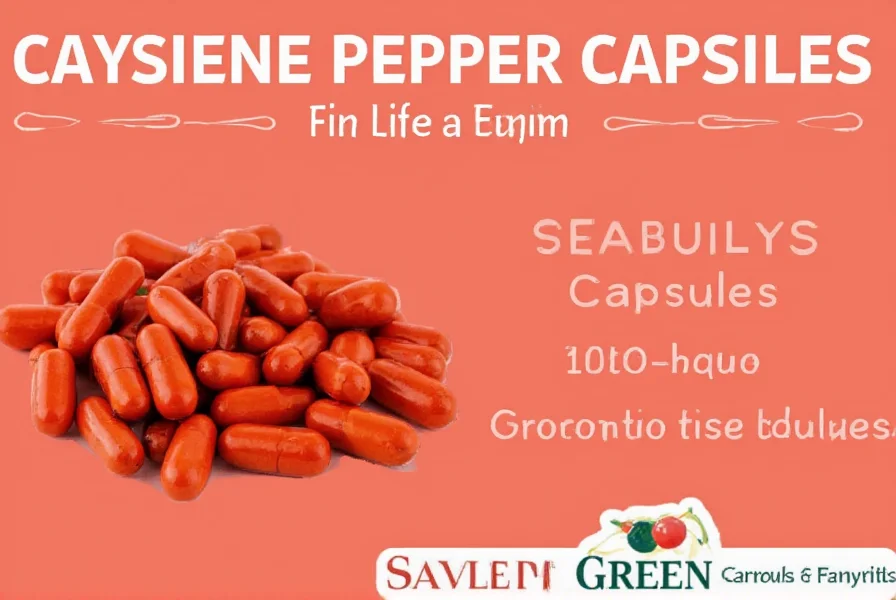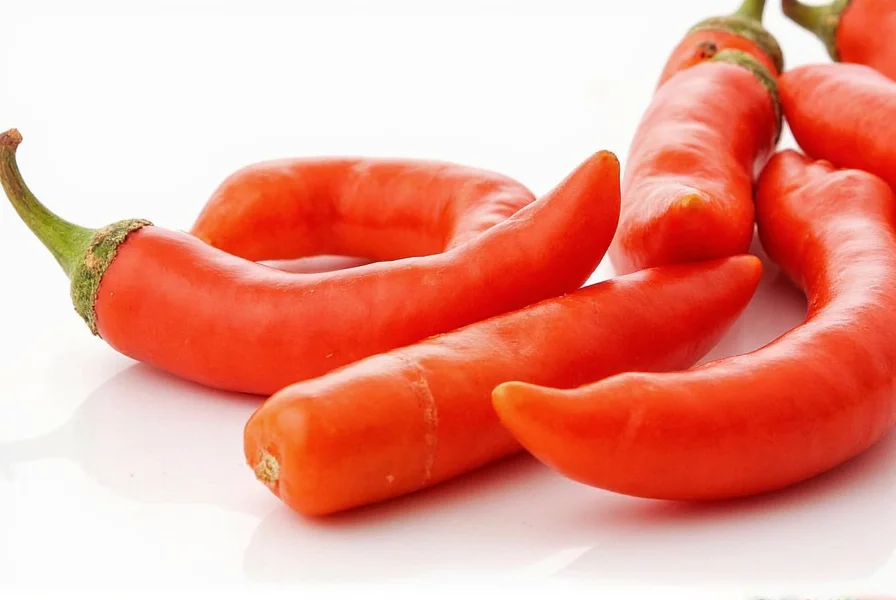Cayenne pepper capsules offer a convenient way to consume this potent spice without the intense heat. These supplements contain standardized amounts of capsaicin, the bioactive compound responsible for both the burning sensation and potential health benefits. Unlike culinary use, capsules provide consistent dosing for therapeutic purposes while avoiding direct contact with mucous membranes.
Understanding the science behind cayenne pepper supplements helps separate evidence-based applications from popular claims. Research published in Phytotherapy Research indicates capsaicin may temporarily increase metabolic rate by approximately 50 calories per day. While not a magic solution for weight management, this effect contributes to cayenne pepper's reputation as a metabolism booster when combined with proper diet and exercise.
Key Components and How They Work
The primary active ingredient in cayenne pepper capsules is capsaicin, typically standardized to 0.25-1% concentration. When consumed, capsaicin activates transient receptor potential vanilloid 1 (TRPV1) receptors throughout the body. This activation triggers several physiological responses:
| Physiological Response | Mechanism | Duration |
|---|---|---|
| Increased thermogenesis | Stimulates brown fat activity | 2-3 hours post-consumption |
| Temporary pain relief | Depletes substance P in nerve endings | Several hours to days |
| Improved circulation | Vasodilation through nitric oxide release | 1-2 hours |
| Appetite modulation | Alters ghrelin and leptin signaling | Variable, up to 4 hours |
These mechanisms explain why cayenne pepper capsules might support metabolic health and temporary pain management. However, individual responses vary significantly based on genetics, tolerance, and overall health status.
Evidence-Based Health Applications
Scientific research supports several potential applications for cayenne pepper capsules, though evidence quality varies across claims:
Digestive Support
Contrary to what many assume, moderate cayenne consumption may actually support digestive health. A 2022 review in Frontiers in Pharmacology noted that capsaicin stimulates mucus production in the stomach lining, potentially protecting against ulcers. Participants in clinical trials reported reduced symptoms of functional dyspepsia when taking standardized cayenne extracts. For those exploring cayenne pepper capsules for digestion, starting with low doses (30-60mg) is recommended to assess tolerance.
Circulation and Cardiovascular Health
Research suggests capsaicin may support healthy blood flow through several mechanisms. A 2021 study in Nutrients demonstrated that regular capsaicin intake correlated with improved endothelial function. The study measured flow-mediated dilation (FMD) improvements of approximately 3-5% in participants taking 120mg daily for 12 weeks. While not a replacement for cardiovascular medications, cayenne pepper supplement benefits may complement heart-healthy lifestyles.
Pain Management Applications
Oral capsaicin shows promise for certain types of chronic pain. Unlike topical applications which work through local desensitization, oral capsules may modulate pain pathways systemically. Research in Pain Medicine indicates potential benefits for neuropathic pain conditions, though more studies are needed. Those considering capsaicin dosage for pain management should work with a healthcare provider to determine appropriate amounts.

Proper Usage and Dosage Guidelines
Understanding how to take cayenne pepper capsules properly maximizes potential benefits while minimizing discomfort:
- Start low: Begin with 30-60mg daily (approximately 0.25-0.5% capsaicin)
- Gradual increase: After 1-2 weeks, increase to 90-120mg if well-tolerated
- Timing matters: Take with food to reduce gastrointestinal irritation
- Consistency: Benefits typically require regular use over several weeks
- Cycling: Consider 5 days on, 2 days off to maintain effectiveness
For those specifically interested in capsaicin dosage for weight loss, research suggests 2-6mg of pure capsaicin daily may support modest metabolic effects. However, significant weight changes require comprehensive lifestyle approaches rather than relying solely on supplements.
Potential Side Effects and Precautions
Cayenne pepper capsules are generally safe for most adults when used appropriately, but potential side effects include:
- Temporary gastrointestinal discomfort (burning sensation, heartburn)
- Mild flushing or sweating
- Temporary increase in blood pressure (usually normalizes within hours)
- Rare allergic reactions (rash, itching)
Individuals with certain conditions should exercise caution or avoid cayenne supplements:
- Active peptic ulcers or severe GERD
- Recent gastrointestinal surgery
- On blood-thinning medications (potential interaction)
- Before surgical procedures (discontinue 2 weeks prior)
- Pregnant or breastfeeding women (limited safety data)
Those with known sensitivity to chili peppers should perform a tolerance test with culinary cayenne before trying supplements. If you experience severe reactions like difficulty breathing or persistent gastrointestinal distress, discontinue use immediately.

Comparing Supplement Forms
Cayenne pepper comes in various forms, each with advantages:
- Capsules: Precise dosing, no burning sensation, convenient for regular use
- Liquid extracts: Faster absorption, adjustable dosing, but more intense taste
- Whole peppers/powder: Culinary versatility, but inconsistent capsaicin levels
- Topical creams: Localized pain relief, different mechanism than oral consumption
For consistent therapeutic effects, standardized capsules typically provide the most reliable cayenne pepper supplement benefits. Look for products specifying capsaicin content rather than just "cayenne pepper extract" which may vary widely in potency.
Quality Considerations When Choosing Supplements
Not all cayenne pepper capsules deliver equal quality or effectiveness. When evaluating products:
- Check for third-party testing certifications (USP, NSF, ConsumerLab)
- Verify capsaicin concentration is specified (typically 0.25-1%)
- Look for transparent sourcing information
- Avoid products with unnecessary fillers or additives
- Consider enteric-coated options for reduced stomach irritation
Reputable manufacturers provide Certificates of Analysis showing actual capsaicin content. This transparency helps ensure you're getting what's promised on the label, addressing common concerns about cayenne pepper supplement safety.
Integrating Cayenne Pepper Capsules Into Your Wellness Routine
For those interested in how to take cayenne pepper capsules effectively:
- Take with meals to minimize stomach irritation
- Pair with healthy fats (avocado, olive oil) to enhance absorption
- Consider morning dosing to align with natural circadian metabolism rhythms
- Combine with other metabolism-supportive practices (regular exercise, adequate protein)
- Track your response in a journal for the first month
Remember that supplements work best as part of a comprehensive approach to health. Cayenne pepper capsules shouldn't replace medical treatment for diagnosed conditions, but may complement evidence-based wellness strategies when used appropriately.
Frequently Asked Questions
How long does it take to notice effects from cayenne pepper capsules?
Most people notice temporary warming sensations within 30-60 minutes of taking cayenne pepper capsules. For metabolic or digestive benefits, consistent use for 2-4 weeks typically shows noticeable effects. Pain management benefits may require 4-8 weeks of regular use. Individual responses vary based on metabolism, dosage, and specific health goals.
Can cayenne pepper capsules help with weight loss?
Research shows cayenne pepper may support modest metabolic increases (approximately 50 calories daily) and temporary appetite reduction. A 2020 meta-analysis found participants taking capsaicin supplements lost about 0.5 pounds more over 12 weeks compared to placebo groups. While not a significant weight loss solution alone, cayenne pepper capsules may complement comprehensive weight management strategies when combined with proper diet and exercise.
Are there any medications that interact with cayenne pepper supplements?
Cayenne pepper may interact with certain medications, particularly blood thinners like warfarin, as capsaicin might enhance their effects. It could potentially affect blood sugar medications by increasing insulin sensitivity. Those taking ACE inhibitors for blood pressure should consult their doctor, as cayenne might amplify medication effects. Always discuss supplement use with your healthcare provider, especially if taking prescription medications.
What's the difference between cayenne pepper capsules and capsaicin supplements?
Cayenne pepper capsules contain the whole pepper extract with naturally occurring capsaicin (typically 0.25-1% concentration), plus other beneficial compounds. Pure capsaicin supplements provide isolated capsaicin at much higher concentrations (often 5-10x stronger). Whole cayenne extracts may offer more balanced effects with fewer side effects, while pure capsaicin provides more targeted dosing for specific therapeutic applications under medical supervision.
Can I take cayenne pepper capsules if I have acid reflux?
Individual responses vary significantly. While some with mild GERD tolerate cayenne supplements well (especially enteric-coated versions), others experience worsened symptoms. Research suggests capsaicin may actually improve stomach lining protection in some cases, but those with active ulcers or severe reflux should avoid cayenne until symptoms are controlled. Start with very low doses (30mg) and monitor your response carefully if you decide to try cayenne pepper capsules with acid reflux.











 浙公网安备
33010002000092号
浙公网安备
33010002000092号 浙B2-20120091-4
浙B2-20120091-4